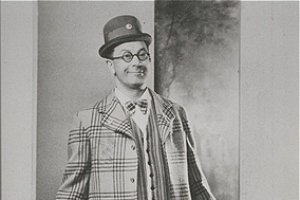|

Harry Gordon (11 July 1893 –
21 January, 1957) was a popular Scottish entertainer, comedian and
impressionist, touring throughout Scotland and further afield. From the
1920s through the 1950s Gordon also produced a large number of recordings,
including several under assumed names. He was known as the Laird of
Inversnecky, a fictional Scottish town he used in his comic routines.
%20_small.jpg)
%20A_small.jpg)
Harry Gordon was born in
Aberdeen as Alexander Gordon, one of five sons and a daughter. He attended
King Street and Central schools, before leaving for work as an insurance
clerk to help with the family finances. His first public appearance on stage
may have occurred at age 12 as Princess Chrysanthemum at Gilcomston Parish
Church. By the time he was fifteen years old, he decided to pursue a
full-time career as an entertainer. He began to develop his stage skills at
various venues in northeast Scotland.
An important turning-point in his career was the 1909 formation of a Pierrot
troupe, with whom Gordon played in many open-air performances. The company
formed in the village of Banchory, which influenced Gordon's most famous
creation, Inversnecky. Gordon began to appear at many theatres in northeast
Scotland and did seaside shows in the summer. He was physically unfit for
active service in World War I but participated in the war effort as an
entertainer.
After the war Gordon often performed in Aberdeen at His Majesty's Theatre
and the Beach Pavilion, originally a wooden concert hall which was replaced
in 1928 by a more permanent structure. Gordon often was the master of
ceremonies at the Beach Pavilion and eventually leased the theatre himself
before its closure in 1941. He had a homely and chatty style, establishing
an intimate rapport with his audience. With his Doric accent and local
knowledge he became one of Scotland's most popular entertainers. He also
appeared many times before the microphone of the BBC's local radio station
in Aberdeen, 2BD, which operated between 1923 and 1929.
Gordon often worked with comic foil Jack Holden and perfected his pantomime
act into one of Scotland's most acclaimed. His appeal never did transfer
well to England, though he worked abroad and on cruise ships. In December,
1956 he suffered a severe attack of influenza, and died in the Royal
Infirmary at Glasgow in January, 1957. His work is still remembered and has
formed the basis of a one-man stage show about his career.
A sample of his work can be
heard at: https://binged.it/2GwMGiD
Our thanks to Stan Bruce for
letting is know about Harry. |

